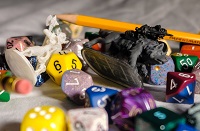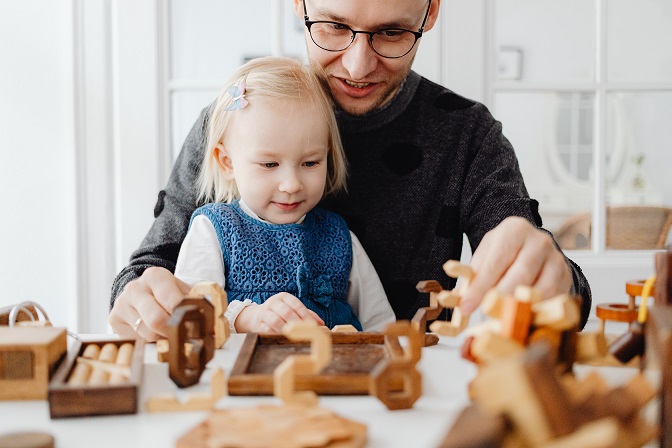If you’re looking for a board game for your preschooler, this article will tell you all you need to know: what factors to consider and what to pay attention to in board games you look at.
How to choose the best board game for a preschooler?
When choosing a board game for a preschooler (ages 4-6), you must consider his/her age, mental abilities, and the group the game will be played in. In games, you look for a short playtime, engaging turns with not many different options, and easy-to-understand rules. To top it off, you want an appealing theme, something your kid loves from popular culture.
Why should your kids play board games?
We, board gamers, are always on the lookout for potential new players. Having children of our own, it’s no wonder we try to introduce them to the hobby as soon as feasible. I tell from experience since I’ve got two such toddlers right here beside me. And boy, do they love playing board games!
While kids younger than three are usually not mentally developed enough to understand what is going on on the table, kids 4-6 are at a perfect starting age. This is the age they start to understand how the world works and what’s going on around them. They can understand what the games are about and they possess enough mental energy to stay focus for a while. It’s also the age, where they develop basic counting skills and can recognize numbers and letters.
Therefore, introducing them to board games makes perfect sense, especially since these can further develop their cognitive abilities. Not to mention they will learn about winning and losing (and how to cope with it) and spend quality family time with you. Learning through playing is one of the most powerful teaching skills, and all kids love games of all types.
Hence, having a board gamer kid does not only benefit them, but it also benefits you – you always have a person who’s willing to play – they love it and have all the time in the world to do it!
Why Is It Good To Play Board Games? 6 Reasons
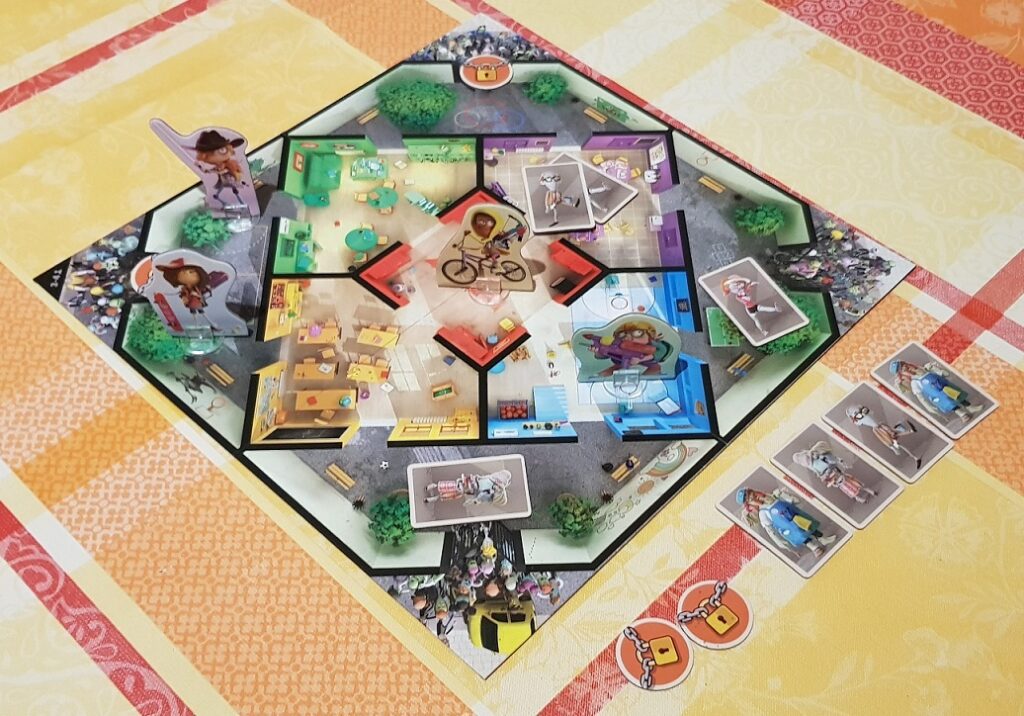
Things to consider when choosing the best board game for a preschooler
The most important factor is, of course, the age requirement. 4-6 is a period of great development, thus the games a 4 year can grasp will be a lot different (simpler) than the games a 6 yo can.
It’s worth noting that the actual age and, let’s call it perceived age, can vary. Some kids just develop more rapidly, while others take more time. While psychologists use standardized tests to assess the level of actual development at several different categories, for board game selection, your own judgment will have to suffice. You know your children best and can analyze whether they can punch above their weight or not.
You can find recommended ages directly on the box, as well as the estimated time to complete one game. These are usually pretty accurate and can be trusted. Complexity is directly dependent on recommended ages – these games are all low complexity. For a more accurate estimate of the complexity, you can turn to Board Game Geek (the largest board game database), but it’s usually not necessary.
Next, I consider the gameplay length to be a very significant factor. Kids lack a long attention span, so normally you’re looking at games where there aren’t many rules to follow and remember, and where there aren’t many options on their turn. This means there’s not much downtime, keeping them engaged through and through.
Board games’ gameplay quality can significantly depend on the number of players involved. Even though there are recommended player counts on the box, I like to confirm this on BGG, since it more accurately tells me how the gameplay is for a certain player number.
The group that will play the game can also raise or lower the complexity crossbar a lot. If the children are playing on their own, you must remain on the lower end of the age/complexity spectrum. However, once a more senior player, who helps the game move along and assists others, is involved, more complex games become attainable.
Cooperative games
If we push this further, with cooperative games, there’s no limit on complexity. I’ve played Robinson Crusoe (which is regarded as one of the more complex cooperative games) successfully with my 5 yo. I concentrated on the strategy and mechanics, while her enjoyment revolved around stories that came along as we were trying to survive on the cursed island.
One caveat of cooperative games is that you shouldn’t play the game for them. You only help with the mechanics – they should make decisions on their own. You should guide them into logical thinking with questions such as: “How do you think should we spend these resources the best?”, “What is the most important thing we should do on this turn that will get us closer to the game goal?”, and similar.
Consequently, let them know what the possible outcomes of their decisions can be, and when this happens, tell them why it happened (and which decisions led to this), regardless of the result (positive or negative). This is a great tool for learning how to deal with consequences – just don’t be judgemental and encourage experimenting, even if it makes you lose the game.
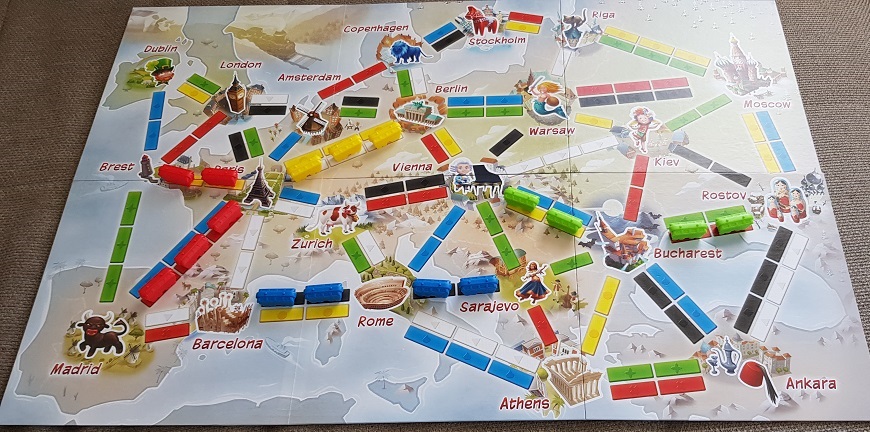
Theme
Children need games that have flesh around their bones – a strong theme and something they can feel in their hands. They can’t relate to strong mechanics, since their strategic mind is not yet developed enough to fully grasp it.
Luckily, board games are full of themes kids adore: dragons, knights, princesses, superheroes, trains, animals, pirates, and intellectual property like Frozen or Marvel will all fall on fertile soil. If you add a bit of fertilizer in the form of miniatures, their enthusiasm will grow like a well-watered plant.
Who owns the game?
Generally, I separate the games my children play into two categories: games that are mine and games that they own.
Games that I own will always be played in a controlled environment. This means a clean and tidy table with one or more adults also playing or at least supervising. I care about my collection and the state the games are preserved. Since these board games are also slightly more expensive, I like to make sure all the components get back in the box in one piece. Of course, the supervision also helps with the complexity scale – kids can play more complex games if an adult supervises.
While this sounds like I’m some sort of a control freak, not allowing my kids any fun – I am not. I give them plenty of freedom and also let them play with the components at will. But I do want them to be respectful to the game and what it stands for: not just the physical, but also artistic and collectible value.
Games that they own are games with minimal complexity and price, games that can be easily replaceable or wouldn’t be missed in the first place. I let them do what they want with them, but I still encourage them to be respectful towards it. “If you lose a piece or two, then you won’t be able to play the game anymore.”
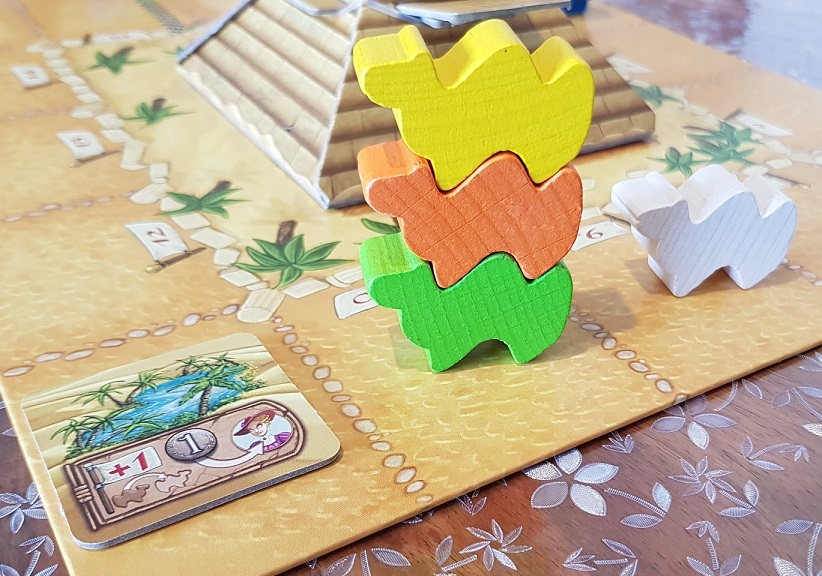
Is the game I’ve chosen any good?
Alright, you’ve selected a title that will be perfect for your kids in terms of complexity and player count. The theme is also spot on – it’s about cute animals, just what they adore. So, how do you tell whether the title is any good?
Anytime I’m looking for a board game, I take it game through 5 steps of recognizing if it’s a good game. These are:
- Looks and First Impressions
- Pedigree (designer and publisher)
- BoardGameGeek
- Written Reviews
- Video Reviews and Playthroughs
As kids’ board games are simpler and cheaper, you can skip a lot of these steps and still get satisfactory results. You can also include social media, but those are normally not dependable sources of information.
Which games did I choose for my kids?
As already mentioned with Robinson Crusoe, I’ve played several complex games with my preschoolers. But the games I played especially with them in mind are (links to full reviews below):
- Ticket to Ride: First Journey (Europe),
- Sushi Go!
- Camel Up
- Zombie Kidz Evolution
- Kingdomino
- Via Magica
All of them proved as successful purchases, but if I have to expose one, it’s Zombie Kidz Evolution. It’s a light cooperative game with a playful theme. Games are tied into a campaign, which allows you to open mysterious envelopes, that introduce new interesting mechanics to the game. And have I mentioned that after every game the players get rewarded with stickers? And you know how much kids love stickers …
Do you like what you just read? Consider subscribing for more content:
